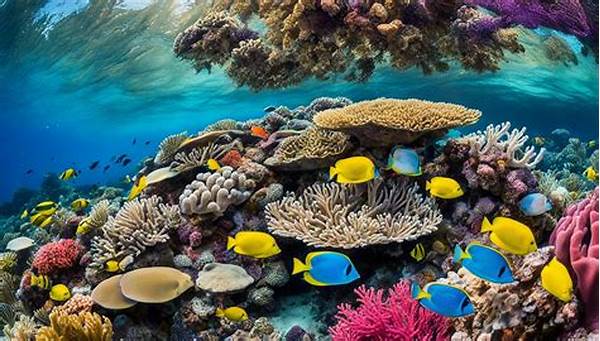Hey there, ocean lovers! 🌊 Today, we’re diving into one of the most vibrant ecosystems on our planet—the coral reefs. These underwater worlds are bustling with life, color, and an array of breathtaking marine creatures. But as beautiful as they are, coral reefs are in trouble. Luckily, there are countless coral reef preservation initiatives underway, aiming to protect and preserve these natural wonders. Let’s explore how some incredible people and organizations are giving coral reefs a helping hand.
Read Now : Weekend Waterpark Trips For Families
The Importance of Coral Reefs
You might be wondering, why all the fuss about coral reefs? Well, they’re not just pretty to look at; they’re fundamental to marine life and human survival. Known as the “rainforests of the sea,” these habitats support about 25% of all marine species. Yes, you heard me right—one in four ocean creatures relies on coral reefs! Apart from offering shelter and food, coral reefs act as natural barriers, protecting coastal communities from storm surges and erosion. They also contribute to local economies through fishing and tourism. But here’s the kicker: coral reefs are currently threatened by climate change, overfishing, and pollution. That’s where coral reef preservation initiatives come in, working tirelessly to save these crucial ecosystems.
Governments, NGOs, and local communities are championing various coral reef preservation initiatives. From reef restoration projects, where damaged corals are regenerated, to establishing marine protected areas that limit human activity—these initiatives are all about giving reefs the time and space to recover. Moreover, raising awareness through education drives ensures more people understand the crucial role reefs play in our world. Armed with knowledge, individuals can make informed choices to reduce their environmental impact. All these efforts are integral to keeping our coral reefs healthy and thriving for generations to come.
Key Strategies in Coral Reef Preservation
1. Reef Restoration
Reef restoration is one of the most direct coral reef preservation initiatives. It involves cultivating and transplanting corals to degraded reef areas to help restore their health. This hands-on approach directly combats the physical damage that reefs face.
2. Marine Protected Areas (MPAs)
Establishing MPAs is another effective strategy in coral reef preservation initiatives. These designated zones limit human interference, providing a safe space for reefs to recover and thrive, away from fishing and recreational pressures.
3. Educating the Masses
Public awareness campaigns are essential coral reef preservation initiatives. By educating people about why reefs matter and how to protect them, we can inspire collective action and shift towards more sustainable practices.
4. Regulating Fishing Practices
Another vital coral reef preservation initiative involves implementing sustainable fishing practices. By regulating overfishing and destructive fishing techniques, we safeguard the reef’s biodiversity and maintain the balance of marine ecosystems.
5. Combating Climate Change
Lastly, global efforts to reduce carbon emissions play a crucial role in coral reef preservation initiatives. By addressing climate change, we reduce coral bleaching events caused by rising sea temperatures, giving reefs a fighting chance.
Challenges in Preserving Coral Reefs
Preserving coral reefs is no walk in the park. It’s a monumental task that faces numerous hurdles. Climate change is arguably the biggest challenge, as rising sea temperatures lead to coral bleaching—a phenomenon that has devastated reefs worldwide. As part of coral reef preservation initiatives, scientists are developing heat-resistant coral species to withstand these temperature changes. However, the effectiveness and ethical implications of such interventions are still under debate.
Human activities, like coastal development and overfishing, add another layer of complexity to coral reef preservation initiatives. These practices disrupt marine habitats and degrade water quality. On a brighter note, community-driven efforts are emerging as powerful tools for change. Local initiatives that involve residents in reef monitoring and sustainable fishing protocols show immense promise. By enlisting the cooperation of local communities, these projects foster a sense of ownership and responsibility, which is vital for long-term success.
Factors Affecting Coral Reef Preservation
1. Climate Change Impacts
Rising temperatures and ocean acidification due to climate change pose significant threats, making coral reef preservation initiatives critical in mitigating these effects.
2. Coastal Development
Construction and development along coastlines can lead to habitat destruction, highlighting the need for strategic coral reef preservation initiatives that promote sustainable practices.
3. Pollution Control
Pollution from land runoff can smother reefs and damage marine life, emphasizing the importance of initiatives that tackle contaminants at their source.
Read Now : Discounted Family Waterpark Tickets
4. Sustainable Tourism
Balancing tourism and conservation efforts is essential, as reinforcing coral reef preservation initiatives in tourism hotspots can help mitigate human impact.
5. Fisheries Management
Overfishing disrupts marine ecosystems, necessitating coral reef preservation initiatives that promote sustainable fishery practices.
6. Marine Debris
Addressing plastic pollution is crucial, as debris harms reef structures, making coral reef preservation initiatives focusing on waste reduction essential.
7. Community Engagement
Involving locals in conservation ensures cultural sensitivity and sustained effort, making community-based coral reef preservation initiatives particularly effective.
8. Research and Innovation
Advancements in coral restoration technology and genetic research are vital components of modern coral reef preservation initiatives.
9. Policy and Legislation
Enforcing regulations and creating policies care pivotal parts of coral reef preservation initiatives to ensure protective measures are legally binding.
10. Financial Investment
Funding is a significant challenge, but it’s crucial for coral reef preservation initiatives to thrive and create lasting impact.
The Future of Coral Reef Preservation Initiatives
Looking ahead, coral reef preservation initiatives are more important than ever. Climate scientists predict that if we continue on our current trajectory, 90% of the world’s coral reefs could be at risk by 2050. It’s clear that immediate and sustained action is needed. Fortunately, new technologies and strategies are emerging, offering glimmers of hope. Advances in coral gardening techniques, where coral fragments are grown in nurseries before being transplanted to restore degraded areas, show promising results.
However, success hinges on global cooperation. Coral reef preservation initiatives require the involvement of international bodies, governments, local communities, and individuals. It’s a collective effort that spans continents and cultures. On a personal level, each of us can contribute by reducing our carbon footprint, supporting sustainable seafood choices, and participating in local conservation projects. By staying informed and active, we can ensure that these vibrant underwater ecosystems continue to thrive and enchant future generations.
Taking Action Locally
Getting involved in coral reef preservation initiatives doesn’t always mean traveling to exotic locations. There are plenty of ways to contribute no matter where you are. Local conservation groups often organize beach cleanups and educational workshops—perfect opportunities to make a difference. Even supporting businesses and policies that prioritize sustainability helps in the long run. Being mindful of your choices, like reducing single-use plastics and opting for reef-friendly sunscreens, can significantly lower human impact on reefs.
Volunteer programs are another excellent way to engage with coral reef preservation initiatives. Whether it’s conducting reef surveys or participating in coral planting, these hands-on experiences offer invaluable insight into the intricate balance of marine ecosystems. Moreover, they empower you to be part of the solution. Remember, every small action counts. The health of our oceans, and by extension, our planet, depends on our willingness to protect these irreplaceable ecosystems through meaningful coral reef preservation initiatives.



